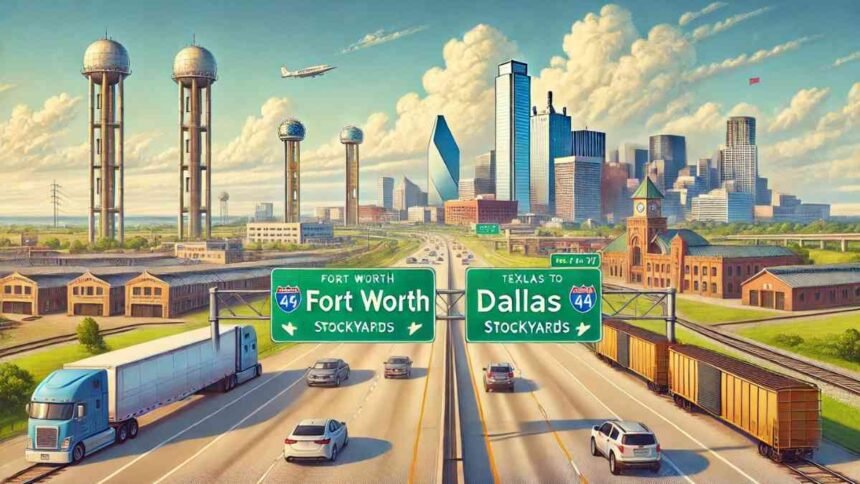Traveling from Fort Worth to Dallas offers a seamless blend of urban landscapes and vibrant culture, with multiple transportation options that cater to convenience and speed. Whether you’re driving or using public transit, the short distance between these two bustling cities provides an easy commute for business or leisure. In this guide, we’ll explore the best ways to navigate this route, covering everything from top travel tips to must-see attractions along the way.
Introduction
The journey from Fort Worth to Dallas has become a common route for locals and visitors alike. Whether for work, entertainment, or tourism, the trip offers more than just a highway drive; it’s an opportunity to experience Texas’ rich culture and dynamic urban life. As of 2024, this commute is easier than ever, with improved public transportation and road networks. This guide will break down all the details you need, from travel tips to hidden gems along the route, ensuring a smooth trip.
Best Travel Routes
There are several ways to travel between Fort Worth and Dallas, and each comes with its unique advantages.
- By Car:
The most popular mode of transportation between Fort Worth and Dallas is driving. The distance is approximately 30 miles, and depending on traffic, the trip can take 35 to 45 minutes. Major highways like I-30 and I-20 offer direct routes, with scenic spots and rest areas in between. - By Train:
For those who prefer public transportation, the Dallas Area Rapid Transit (DART) system offers an efficient rail service. The Trinity Railway Express (TRE) operates between Fort Worth and Dallas, making several stops along the way. This is a great option for those who want to avoid traffic while enjoying a comfortable ride. - By Bus:
Bus services such as Greyhound and local operators also provide affordable and convenient travel between the cities. The bus ride typically takes about an hour, offering an economical alternative to driving.
Best Times to Travel
Timing your trip from Fort Worth to Dallas can make a significant difference. To avoid heavy traffic, consider traveling early in the morning or late in the evening. Weekends often have less congestion compared to weekdays, especially during rush hours. Public holidays can also affect travel times, so it’s advisable to plan accordingly.
Must-Visit Stops Along the Route
The Fort Worth to Dallas route is not just about reaching the destination; it’s also about what you can discover along the way.
- Six Flags Over Texas:
Located in Arlington, this massive amusement park is a perfect pit stop for families. With thrilling rides and entertainment, it’s a popular spot for both Fort Worth and Dallas visitors. - AT&T Stadium:
Also situated in Arlington, the AT&T Stadium is the home of the Dallas Cowboys. Even if you’re not catching a game, the stadium offers tours that give you a behind-the-scenes look at this massive sports complex. - Kimbell Art Museum:
If you’re starting from Fort Worth, the Kimbell Art Museum is a must-visit. Known for its world-class art collection, it’s a great place to soak in some culture before heading to Dallas.
Dallas to Fort Worth: The Reverse Route
While many travelers focus on the trip from Fort Worth to Dallas, the reverse route, Dallas to Fort Worth is equally popular. Those commuting back often enjoy the cultural contrasts between the two cities. Fort Worth, with its laid-back atmosphere and historic charm, provides a refreshing change from Dallas’ fast-paced city life. The key here is to plan your journey based on your preferences, whether you’re looking for a quick return or an extended stay in both cities.
Transportation Costs
Budgeting for your Fort Worth to Dallas trip depends on your mode of transportation:
- By Car: Gas prices can range from $3.50 to $4 per gallon in 2024, making the total cost for the trip about $10 to $15.
- By Train: A one-way ticket on the TRE typically costs $6 to $12, depending on the type of service.
- By Bus: Bus services can range from $5 to $20, with frequent discounts available for online bookings.
Comparing Fort Worth and Dallas
Both Fort Worth and Dallas have unique characteristics that make each city special. While Fort Worth is known for its cowboy heritage and relaxed ambiance, Dallas is recognized for its booming business scene and modern skyline. Here’s a quick comparison to help you plan your trip:
- Culture: Fort Worth is home to the Stockyards and rich Western traditions, while Dallas boasts cutting-edge museums and cultural events.
- Nightlife: Dallas is known for its high-energy clubs and restaurants, while Fort Worth offers a more relaxed, family-friendly vibe.
- Shopping: Both cities are excellent for shopping, but Dallas’ Galleria and NorthPark Center offer a more extensive range of high-end stores.
Travel Tips
- Plan for Traffic: Dallas and Fort Worth are growing rapidly, and traffic can be an issue during peak hours. Use navigation apps to check for delays and consider alternate routes.
- Weather Considerations: Texas summers can be extremely hot, so ensure your vehicle’s air conditioning is working. Winter can also bring unexpected ice storms, so check the weather forecast before departing.
- Pack Essentials: Whether you’re driving or taking public transport, it’s always good to carry water, snacks, and entertainment, especially if you’re traveling with kids.
Conclusion
Traveling from Fort Worth to Dallas (and vice versa, Dallas to Fort Worth) is more than just a commute; it’s a journey filled with cultural experiences, scenic routes, and historical landmarks. Whether you’re driving, taking the train, or opting for a bus, planning ahead ensures a smooth and enjoyable trip. As Texas continues to grow, so do the opportunities to explore these two iconic cities in depth.
For More Visit, Viraltimes.co.uk







